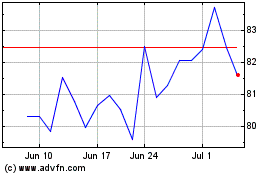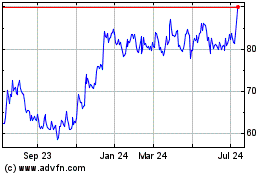Economic and Market Outlook from UMB Financial CIO Bill GreinerBill Greiner is chief investment officer of UMB Financial Corpora
January 23 2006 - 9:33AM
Business Wire
UMB Financial Corporation (Nasdaq:UMBF) Chief Investment Office
Bill Greiner releases the following economic and market outlook for
2006. General Forecast During 2005, the equity market faced two
headwinds, rising interest rates and slowing corporate profit
growth rates. However, the economy continued a remarkable
above-trend run this past year. In 2006 we believe the U.S. economy
will grow roughly "at trend," with the markets reflecting
choppiness in the economic outlook. By the end of the year, many
markets could be considering the possibility of the economy falling
into recession. 2006 Outlook -- U.S. Economy As is typical with
annual market cycles, we believe the economy during 2006 will be
subjected to many cross-currents. From a positive standpoint, the
U.S. economy is a very diverse, resilient engine. Our bottom-line
concerning the U.S. equity market is positive, but not spectacular.
Look for the market to generate positive returns during 2006, but
the road may be rocky. We expect price gains for the year in the
mid-to-high single digit range. If our outlook for the macro
environment is reasonably accurate, it may be safe to assume the
following concerning activity within the U.S. equity market during
2006: -- The current "bull" market is aged by historical standards.
It has been more than three years since the market has had more
than a 20-percent decline. -- Earnings momentum has been
decelerating since 2004. We expect the same in 2006. -- All eyes
are currently on the Fed. Are interest rates going to rise more
than another .5 percent? We believe the market is "pricing" short
rates to move up to that level. -- From a cycle standpoint, the 2nd
year of a Presidential term tends to be the weakest of the
four-year cycle. If history holds, look for the equity market to be
challenged until sometime in the summer, after which a strong rally
may ensue. Consumer Spending As the consumer represents close to 70
percent of U.S. economic power, this variable is critical. Housing
is a swing factor that effects not only current economic activity
directly, but also impacts overall consumer sentiment and the
willingness of the consumer to spend extra capital. The U.S.
housing market's reaction to higher interest rates will be of
particular risk to consumer sentiment and ultimately to the
magnitude of the contraction in consumer spending. One theme of our
economic outlook is centered on consumer discretionary spending
slowing, driven by a slowdown in the housing market coupled with
oil prices remaining "sticky" on the upside. These negative trends
should be partially offset by continued improvements in the
employment picture. We expect steady, if not unspectacular consumer
spending in 2006. Capital Spending The flip-side to this rather
dour view of top-line demand growth is capital spending. We expect
corporate profits (as measured by S&P 500) will grow "at trend"
-- 6 to 8 percent. Factors which have led to capital spending
increases over the last number of years are still in place. These
factors include: -- Low cost of capital. While rising, interest
rates are still low relative to recent economic memory. -- High
profitability. Cash-flow profitability is currently double that of
the historical norm. -- Rising productivity. Most corporate leaders
have come to the realization that capital spending holds the key to
rising productivity levels within their companies. -- Need to stay
competitive. Many organizations are raising capital spending rates,
simply due to the view that competitors are doing the same. The
need to stay competitive and protect profit margins is intense. --
Strong balance sheets. Overall, corporate balance sheets are
unlevered and highly liquid, based on historical norms.
Consequently, companies have the need and the ability to raise
capital spending rates. Our outlook calls for nonresidential-fixed
investment to rise by 9 percent during 2006, as compared to a
growth rate of 3 percent for the overall economy. Capital spending,
and companies that cater to that trend, may help drive corporate
profits during 2006. Exports We expect exports to show strong
growth during 2006. Our expectation is for exports to grow by
roughly 7 percent during 2006, compared to 5 percent growth during
2005. Many areas of the world continue to grow more rapidly than
the U.S., and we expect that trend to continue. Several of our
trading partners are growing nicely and others are stabilizing.
Japan's economy, for example, appears to be coming out of the
economic quagmire they have been in since the early 1990s. Some
European economies appear to be slowing and attempting to revive.
If these trends continue, this will benefit the U.S. due to rising
demand from these large trading partners, and subsequent export
growth. Conclusion All of the above leads to the conclusion that
earnings growth during 2006 should come in "at trend." The positive
effects to top-line growth from rising capital spending and
improved export demand should be partially offset by a contraction
in the growth rate of consumer discretionary expenditure. Look for
S&P 500 earnings to grow in the 6 to 8 percent range. Bill
Greiner is chief investment officer of UMB Financial Corporation's
Asset Management Division is Kansas City, Mo. He has spent his
entire career in the investment field, with more than 25 years
investment management experience. Greiner most recently was named
Business Week's "Fearless Forecaster: 2005 Stock Market Strategist
of the Year" in December 2005. He received this distinction by
being the investment strategist who most accurately forecasted
where the U.S. markets would end up at the close of 2005. UMB
Financial Corporation (Nasdaq:UMBF) is a multi-bank holding company
headquartered in Kansas City, Mo., offering complete banking and
related financial services to both individual and business
customers. Its banking subsidiaries own and operate 140 banking
centers throughout Missouri, Illinois, Colorado, Kansas, Oklahoma,
Nebraska and Arizona. Subsidiaries of the holding company and the
lead bank, UMB Bank, n.a., include an investment services group
based in Milwaukee, Wisconsin, a trust management company in South
Dakota, and single-purpose companies that deal with brokerage
services, consulting services and insurance. UMB was named one of
Business Week's "Web Smart 50" companies in 2005. UMB Investment
Advisors is a division within UMB Bank, n.a., that manages active
portfolios for employee benefit plans, endowments and foundations,
fiduciary accounts, and individuals. UMB Bank, n.a., is an
affiliate within the UMB Financial Corporation. Securities and
investment products are: Not FDIC Insured -- May Lose Value -- No
Bank Guarantee (BOXED) The opinions and forecasts are based on
information and sources of information deemed to be reliable, but
UMB Investment Advisors does not warrant the accuracy of the
information that this opinion and forecast is based upon. Further,
the information and opinions contained within this report is
subject to change at any time without notice and should not be
construed as investment advice or recommendation of any specific
security. The opinions and forecasts indicated within the report
might not come to pass.
UMB Financial (NASDAQ:UMBF)
Historical Stock Chart
From Jun 2024 to Jul 2024

UMB Financial (NASDAQ:UMBF)
Historical Stock Chart
From Jul 2023 to Jul 2024
